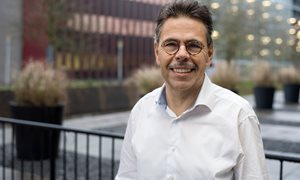
Christian Gilissen has been appointed Professor of Genome Bioinformatics at the Radboudumc / Radboud University as of 1 October 2021. He develops computer programs for the analysis of DNA and uses these programs to find genetic causes of diseases. He then ensures that doctors can actually use these new diagnostics for patients.
Christian Gilissen (1980, Geleen) studied Computer Science and obtained his PhD at the Genetics Department of Radboudumc. In 2016, he started his own research group at the same department, working on the development of software and algorithms for the analysis of DNA from patients. Gilissen spends half of his time on scientific research, the other half leading the analyses for the genetic diagnostics laboratory.
Smart algorithms
An important topic within his research is the detection of genetic causes of intellectual disabilities. "We use DNA sequencing, a method by which we map out a patient's DNA. We invent clever algorithms that allow us to analyze the sequencing data of large numbers of patients at the same time, and in this way we find new genes that cause developmental problems," Gilissen says. "Last year, the results of a large study appeared in the scientific journal Nature, with 28 new genes."
In addition, Gilissen studies DNA evolution, looking for new DNA changes in a child that are not present in the parents. "We investigate the biology of so-called de novo mutations. Do they originate in the oocyte or in the sperm cell and how does that happen? We show that a higher age in the parents leads to more de novo mutations in a child. Sperm cells from fathers who are older contain more new mutations; for each year of the father's life, about one mutation is added to the sperm cell. Oocytes from mothers acquire an average of one mutation every four years. It is striking that mutations in the oocyte often occur in clusters, they have then arisen together. We investigate which biological processes underlie these events."
Long read sequencing
In the future, Gilissen also wants to focus on the development of new techniques in genetic diagnostics. Exome and genome sequencing already exist for quite some time. In exome sequencing, researchers look only at the genes, which contain the information for life. In genome sequencing, they also look at the DNA between the genes. But recently, long read sequencing is also emerging. What are the differences and advantages?
"In those first two methods, you analyze small pieces of DNA each time. The length of the DNA is measured in base pairs. Those short pieces of 150 base pairs don't always work well if, for example, you want to show that pieces of DNA have disappeared, so-called deletions," Gilissen explains. "With the new technique, the pieces of DNA analyzed are much longer, as much as 20,000 base pairs. This makes it easier for us to see whether pieces of DNA have disappeared in a patient. This technique requires other algorithms for the analysis. Therefore we are currently testing this technology. The technique is still too expensive for application in standard diagnostics, but that could be very different in three years or so."
Direct implementation for patients
In addition to his work as a researcher, Gilissen has also been head of Bioinformatics at Genome Diagnostics Nijmegen / Maastricht since 2016, the laboratory that, with a team of twenty-five bioinformaticians, provides the analysis of genetic tests for patients at both Radboudumc and MUMC+. Gilissen can therefore actively implement the latest technology and ensure that patients actually benefit from it.
Gilissen is also a board member and member of the committee for the scientific program at the European Society of Human Genetics (ESHG). Some of the major prizes and grants he has been awarded include a Veni and Vidi grant from NWO, a Young Investigator Award 2014 from the Dutch Society for Human Genetics and the Isabelle Oberlé Award 2014 from the ESHG.
Read more about the work of Christian Gilissen:
News 2021: New way of diagnostics detects undetectable genetic defects
News 2021: Hidden genetic defects contain real risks for serious diseases
-
Want to know more about these subjects? Click on the buttons below for more news.
More information
Annemarie Eek

wetenschapsvoorlichter
Related news items

Willem Mulder appointed professor of Precision Medicine
4 October 2022Willem Mulder has been appointed professor of Precision Medicine at Radboud university medical center / Radboud University. He develops new drugs for immunotherapy against cancer, inflammation, rejection reactions and infectious diseases.
go to page
Immune cell becomes tumor cell by a molecular switch to higher lipid uptake Protein CD37 plays an important role in the development and prognosis of B-cell lymphoma
19 September 2022When B cells of the immune system no longer have the protein CD37 on their surface, they can change into tumor cells that form blood cancer. CD37 inhibits fat uptake in B cells. If this protein is missing, a tumor cell absorbs much more fat and therefore grows faster.
go to page



